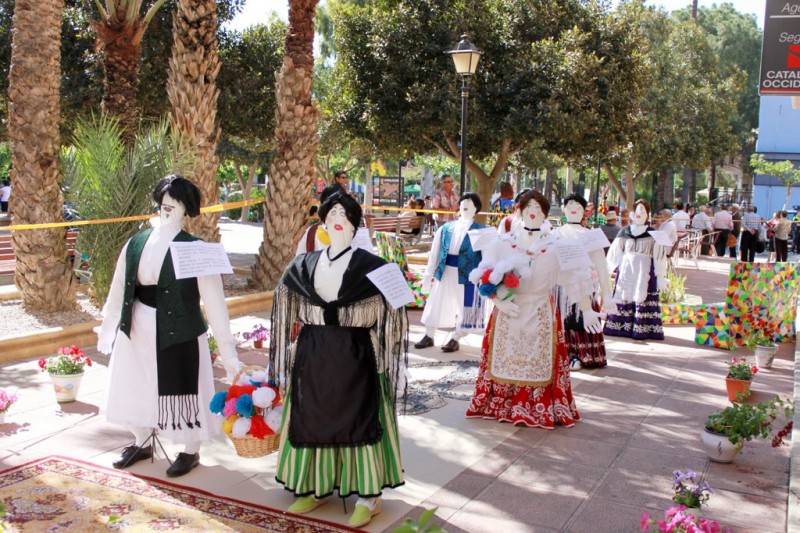- Region
- Águilas
- Alhama de Murcia
- Jumilla
- Lorca
- Los Alcázares
- Mazarrón
- San Javier
-
ALL AREAS & TOWNS
- AREAS
- SOUTH WEST
- MAR MENOR
- MURCIA CITY & CENTRAL
- NORTH & NORTH WEST
- TOWNS
- Abanilla
- Abarán
- Aguilas
- Alamillo
- Alcantarilla
- Aledo
- Alhama de Murcia
- Archena
- Balsicas
- Blanca
- Bolnuevo
- Bullas
- Cañadas del Romero
- Cabo de Palos
- Calasparra
- Camping Bolnuevo
- Campo De Ricote
- Camposol
- Canada De La Lena
- Caravaca de la Cruz
- Cartagena
- Cehegin
- Ceuti
- Cieza
- Condado de Alhama
- Corvera
- Costa Cálida
- Cuevas De Almanzora
- Cuevas de Reyllo
- El Carmoli
- El Mojon
- El Molino (Puerto Lumbreras)
- El Pareton / Cantareros
- El Raso
- El Valle Golf Resort
- Fortuna
- Fuente Alamo
- Hacienda del Alamo Golf Resort
- Hacienda Riquelme Golf Resort
- Isla Plana
- Islas Menores & Mar de Cristal
- Jumilla
- La Azohia
- La Charca
- La Manga Club
- La Manga del Mar Menor
- La Pinilla
- La Puebla
- La Torre
- La Torre Golf Resort
- La Unión
- Las Palas
- Las Ramblas
- Las Ramblas Golf
- Las Torres de Cotillas
- Leiva
- Librilla
- Lo Pagan
- Lo Santiago
- Lorca
- Lorquí
- Los Alcázares
- Los Balcones
- Los Belones
- Los Canovas
- Los Nietos
- Los Perez (Tallante)
- Los Urrutias
- Los Ventorrillos
- Mar De Cristal
- Mar Menor
- Mar Menor Golf Resort
- Mazarrón
- Mazarrón Country Club
- Molina de Segura
- Moratalla
- Mula
- Murcia City
- Murcia Property
- Pareton
- Peraleja Golf Resort
- Perin
- Pilar de la Horadada
- Pinar de Campoverde
- Pinoso
- Playa Honda
- Playa Honda / Playa Paraíso
- Pliego
- Portmán
- Pozo Estrecho
- Puerto de Mazarrón
- Puerto Lumbreras
- Puntas De Calnegre
- Region of Murcia
- Ricote
- Roda Golf Resort
- Roldan
- Roldan and Lo Ferro
- San Javier
- San Pedro del Pinatar
- Santiago de la Ribera
- Sierra Espuña
- Sucina
- Tallante
- Terrazas de la Torre Golf Resort
- Torre Pacheco
- Totana
- What's On Weekly Bulletin
- Yecla


- EDITIONS:
 Spanish News Today
Spanish News Today
 Alicante Today
Alicante Today
 Andalucia Today
Andalucia Today
Los Mayos, a fiesta of national tourist interest in Alhama de Murcia
Alhama de Murcia celebrates its annual Los Mayos festivities at the beginning of May
Throughout Spain and the rest of Europe, May Day celebrates the spring and the arrival of a period of fertility and abundance. Its roots lie firmly in the pagan past, although it was naturally absorbed into the Christian faith as it became more widespread and many of its rituals adapted to Christianity.
The May celebrations in Alhama de Murcia are called Los Mayos, and were declared as being of National Tourism Interest in 2019 due to the unique traditions at their core. There are three distinct elements of the celebrations in Alhama which have evolved to become a unique event in the Region of Murcia, a fiesta which not only attracts thousands of visitors from the Spanish community but is also extremely popular with the expat visitors on account of its vibrancy and range of activities.
Las Cruces de Mayo
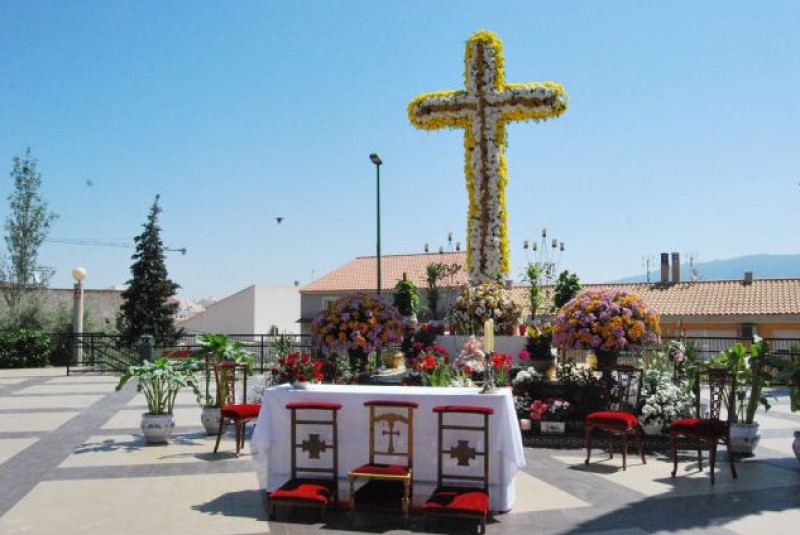
The pagan fiestas held in spring in the past focused on the feminine and the relationship with the sacred female figure of fertility, Mother Nature or the Earth Goddess, with flowers representing fertility and abundance, dressing sacred places, making offerings and giving thanks for the fruitfulness of the earth. As Christianity spread, these traditions were adapted to celebrate the Virgin Mary and in many parts of Spain she is honoured today with the “Cruces de Mayo”. These are crosses dressed with flowers which are displayed in conjunction with plants and religious tokens, a tradition which is very much a part of the Alhama celebrations, with beautifully decorated floral crosses proudly displayed in homes and public places throughout the town which can be visited and admired as part of the Los Mayos.
The Crosses are displayed early in the week and remain in place until the end of the fiestas.
La Plantá, the "planting" of figures
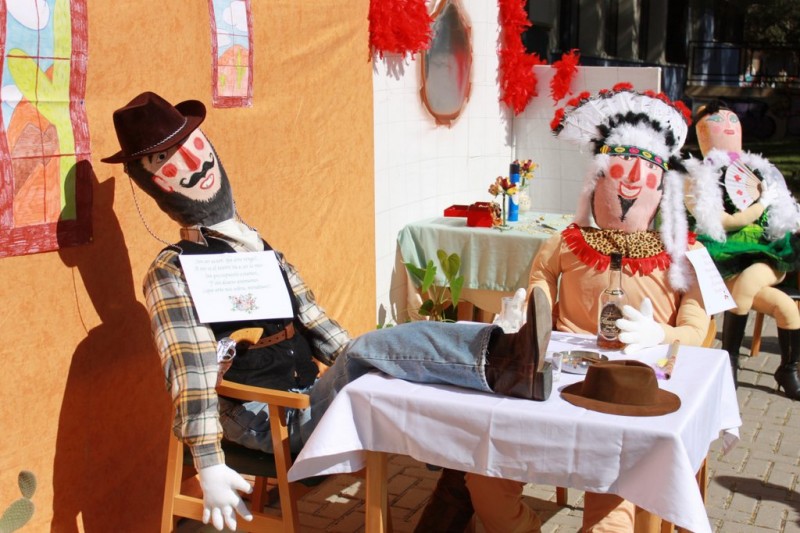
Again, this tradition has its roots in the pagan past, with the symbolic burning and cleansing act of seeing out the old and bringing in the new. Representative figures would be made of whatever materials were available with symbolic messages which could be ‘cleansed" at the end of the festival as an act of renewal and regeneration.
There are many celebrations worldwide in which figures are used symbolically to represent this concept, and in Alhama the act of creating manequins developed into a tradition which dates back certainly to the beginning of the twentieth century and very probably much further.
The figures are far from works of art, instead retaining a kind of amateur charm, and are made from fabrics stuffed with whatever is available (mainly straw). They are dressed and set in scenes which represent everyday life, so all around the town displays are created showing residents involved in traditional activities; sitting sewing outside their houses, working in their gardens, or just chatting to each other.
They are homely but are endowed with a satirical twist, many of them bearing posters which poke fun at local political figures, confront topical issues or put across a point of view about social subjects, airing them in a way which makes an otherwise uncomfortable topic a point of discussion.
Great pride is taken in setting up the displays, and they are hidden away from public view until the day of the Plantá. A whole day is then devoted to visiting them all, either on foot or on board the tourist train, and it is also possible to complete the tour by bicycle. Maps can be picked up from the tourist office, where tickets are on sale for the tourist train which runs in a continuous loop from just outside the office – these tickets are inexpensive at around a euro a time and save a lot of walking, but can only be purchased on the day of the Mayos itself.
The Corremayos
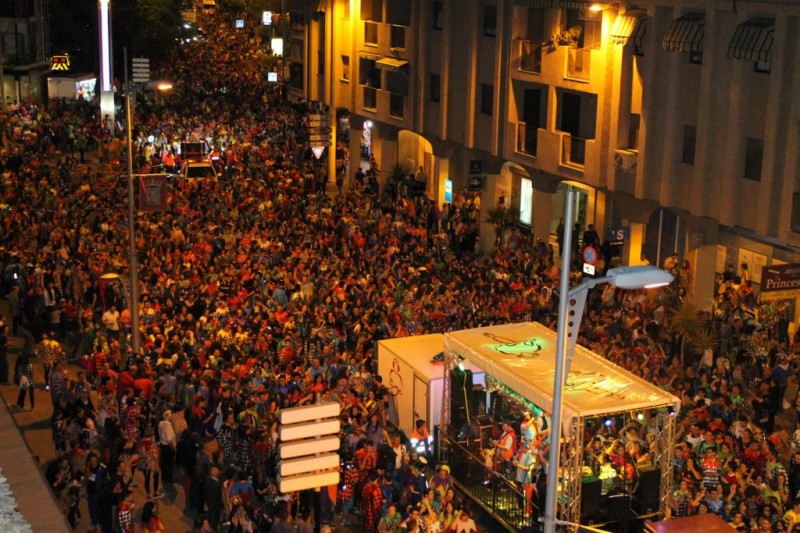
The third element of the fiestas is the “Corremayos”, a tradition which again has pagan roots and dated back to when the young men of a town would go out early in the morning and dress the homes of the girls with flowers, many of them ending up roaming around in groups on May Day causing havoc.
In Alhama, the Corremayos dress in harlequin jester costumes, vibrantly coloured and with appropriate headwear, and roam around in large groups visiting the planted figures. As in most fiestas, they carry out what is called a Pasacalles, which is a parade accompanied by musicians and musical groups.
There are two of these in Alhama, on the Saturday night and the Sunday morning, and it is well worth going along to see the explosion of colour as they fill the streets with noise and celebration. On the main day of the celebrations, many townspeople wander around dressed in their Corremayos costumes and there are usually a few on sale for those who don´t have one!
Locations
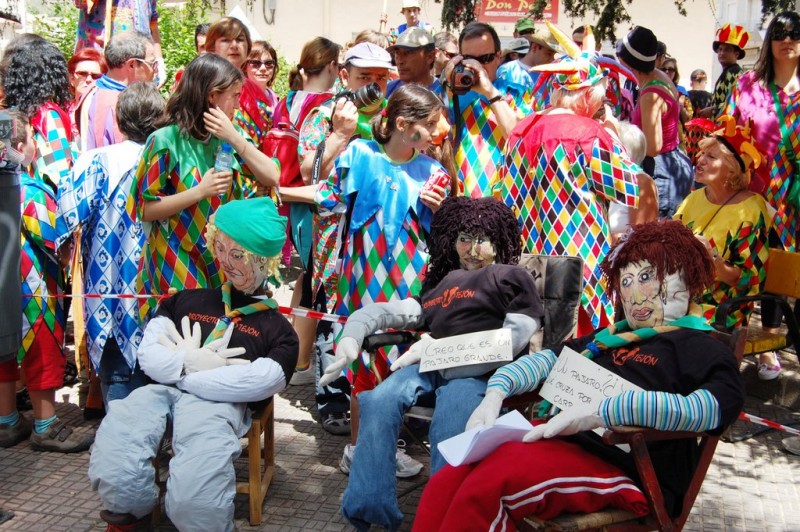
The Plaza de la Constitución is the centre of most activities, which is where you'll find the tourist office and Town Hall. Opposite them is the Parque La Cubana, in the centre of which is the Auditorio Municipal (an open air auditorium), and then at the far end the Recinto Ferial with a big fairground and children’s area.
The tourist train runs throughout the festivities and departs from outside of the open-air auditorium opposite the tourist office.Tickets can be purchased on the tourist train.
The tourist office has maps and programmes and is open throughout Los Mayos.
The new programme is published every year in the what's on section of this webpage.
For more local information in English, including news, static information and forthcoming events, go to Alhama Today.

